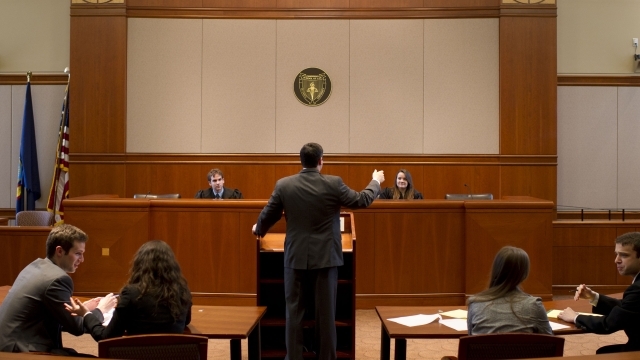

Law
Bankruptcy LL.M.
The Nation's Only LL.M. Program Dedicated to Bankruptcy Law
- Home
- Academics
- J.D. Programs
- Dual Degree Programs
- Bankruptcy LL.M.
St. John’s offers the only LL.M. program in the United States focused entirely on bankruptcy law, and it’s based in New York City—the heart of bankruptcy practice. Our curriculum is designed with care and taught by top practitioners, judges, and academics in the field.
The program is selective. To apply, you need a J.D. from an accredited U.S. law school or international experience in bankruptcy or insolvency plus working knowledge of the U.S. legal system. If you're an internationally trained lawyer who also wants to qualify for the New York Bar Exam, the U.S. Legal Studies LL.M./Bankruptcy LL.M. dual degree program may be the right path for you.
Questions? Contact us at [email protected].
- Degree Type
- LLM
- Area of Interest
- Law, Policy & Government
- Associated Colleges or Schools
- Program Location
- Queens Campus
- Required Credit Hours
- 24
- Associated Centers or Institutes
Curriculum
You can start the Bankruptcy LL.M. program in the fall or spring. If you're a U.S. citizen or permanent resident, you can study part time and take up to four years to earn the 24 credits required for the degree. Many courses are available online or in hybrid formats, giving you flexibility to fit the program into your schedule.
Most students in the program take Bankruptcy LL.M. courses to accrue the 24 credits needed to earn their degree. But, depending on availability and with permission from the Vice Dean for Academic Affairs, you can also take elective courses through the J.D. program at St. John's Law and the M.B.A. program at St. John’s Peter J. Tobin College of Business.
Required Courses
You must complete at least two of these courses to graduate:
Business Bankruptcy Reorganizations (2 credits) (BANK 1080/BUSI 5050)
Consumer Bankruptcy (2 credits) (BANK 1070/BUSI 5020)
Creditors’ Rights (3 credits) (BANK 1000/BUSI 4080)
Elective Courses
You can choose from these elective courses:
Advanced Bankruptcy Research (2 credits) (BANK 1020/BUSI 6030)
Bankruptcy Clerkship Seminar (1 credit) (BANK 5080/BUSI 5055)
Bankruptcy Practice: Complex Litigation (2 credits) (BANK 2020/BUSI 5080)
Bankruptcy Practice: Representing Trustees (1 credit) (BANK 4040/BUSI 5065)
Bankruptcy Procedure (2 credits) (BANK 3040/BUSI 5000)
Bankruptcy Sales (1 credit) (BANK 5020/BUSI 5070)
Bankruptcy Taxation (2 credits) (BANK 1060/BUSI 5010)
Cross Border Bankruptcy (2 credits) (BANK 6000/BUSI 6060)
Drafting Bankruptcy and Commercial Agreements (2 credits) (BANK 2040/BUSI 5030)
Drafting: Bankruptcy Litigation Documents (2 credits) (BANK 4080/BUSI 6050)
Executory Contracts in Business Bankruptcy (1 credit) (BANK 5050/BUSI 5040)
Real Estate Workouts & Bankruptcy (2 credits) (PROP 2030)
Securitization, Structured Finance & Capital Markets (2 credits) (BANK 4010/BUSI 5060)
Select Topics in Bankruptcy (1 credit) (BANK 4060/BUSI 6020)
Small Business Bankruptcy (1 credit) (BANK 4030/BUSI 5090)
Valuation and Remedies in Bankruptcy (1 credit) (BANK 5090/BUSI 5085)
- Students may take up to 3 credits from the following J.D. electives:
Business Planning (3 credits) (BUSI 1060)
Corporate Finance (3 credits) (BUSI 2010)
Secured Transactions (3 credits) (BUSI 2050)
More Information
You may be able to take other elective courses with permission from the Vice Dean for Academic Affairs. You'll find more information about the courses listed above in the Law School's course catalog.
J.D./LL.M. Joint Degree Program
St. John’s Law students can finish both a J.D. and a Bankruptcy LL.M. in as little as seven semesters. Up to 15 credits of bankruptcy courses you take as a J.D. student can count towards the 24 credits needed to earn your LL.M. degree.
That means with just one extra semester of study, you'll graduate with both degrees—and a stronger edge in the job market. Many of our Bankruptcy LL.M. students go on to work as interns or law clerks in federal bankruptcy courts during their last semester in the LL.M. program or soon after graduating.
Student Opportunities
Our Bankruptcy LL.M. students are part of a vibrant St. John's Law community and have opportunities to build knowledge, skills, and connections outside the classroom. Here is just a sampling of those opportunities:
Our Center for Bankruptcy Studies is home to all of the Law School's bankruptcy initiatives and offers a wide range of programs for students, faculty, alumni, and practitioners throughout the year.
St. John's Law collaborates with the American Bankruptcy Institute (ABI) to publish the American Bankruptcy Institute Law Review. Widely regarded as the nation's premier scholarly bankruptcy journal, the ABI Law Review contains articles and student notes on cutting-edge issues of bankruptcy law and practice. Other publications include the St. John's Case Blog and the Bankruptcy Research Library.
Jointly sponsored by St. John’s Law and ABI, the annual Duberstein Bankruptcy Moot Court Competition is the nation's only bankruptcy moot court competition and its largest single-site appellate moot court competition.
St. John's Law students can gain hands-on experience in, and practical knowledge of, bankruptcy law by participating in the Bankruptcy Law Society (BLS). Throughout the academic year, BLS holds regular meetings and hosts events where distinguished judges and attorneys discuss bankruptcy practice and current issues in the field.
Applying to the Program
Application Process
We look for strong candidates who can succeed in the Bankruptcy LL.M. program’s demanding curriculum. When reviewing applications, we consider your academic record in college and law school, your work experience, your writing, and other relevant qualifications. We place the most weight on your academic record as a J.D. student at an accredited U.S. law school, along with your employment history and potential to excel in bankruptcy practice.
You can apply to the Bankruptcy LL.M. program through St. John's admissions portal or through LSAC. Since students can start the program in the fall or spring semester, we use a rolling admissions process. Applications are reviewed by the Director of the Center for Bankruptcy Studies, the LL.M. Admissions Committee, and the Dean of Admissions as they come in, and we make every effort to share admissions decisions promptly.
Application Materials
You'll find a full list of application materials on our LL.M. application process page. But please note:
Letters of Recommendation
You must submit at least two letters of recommendation with your application, addressing your ability to succeed in this intensive LL.M. program. If you are a current law student or recent graduate, at least one letter should come from a faculty member. If you are a practitioner, at least one letter should come from a bankruptcy or insolvency professional who has worked with you.
Personal Statement
In your personal statement, you should explain why you want to enroll in St. John’s Bankruptcy LL.M. program and how the program will help you achieve your career goals. You should also describe any bankruptcy or insolvency coursework and relevant professional experience.
Writing Sample
Ideally, you should submit a writing sample on a bankruptcy/insolvency law topic, or a related subject.
International Applicants
If you earned your law degree outside the United States, you should already have some education or work experience in bankruptcy or insolvency law in your home country. To do well in the program, you'll also need a basic understanding of American law, especially civil procedure, contracts, and business organizations.
If you don’t have that background, you should apply to our U.S. Legal Studies LL.M. program in addition to the Bankruptcy LL.M. program. In the U.S. Legal Studies LL.M. program, you’ll spend two semesters studying U.S. law and then can move on to the Bankruptcy LL.M. program. The two programs take four semesters of full-time study to complete and can also help you qualify for the New York Bar Exam.
Questions?
We answer questions applicants frequently ask about the Bankruptcy LL.M. program and our application process on our LL.M. application process page. Admitted students can refer to the information we share on our admitted LL.M. students page. If you still have questions, please email the Graduate Studies team at [email protected].
Contact Us
Office of Graduate Studies
St. John's University School of Law
8000 Utopia Parkway
Queens, NY 11439
718-990-6474
[email protected]
Tuition & Scholarships
All students are automatically considered for scholarships. No separate application is needed.

